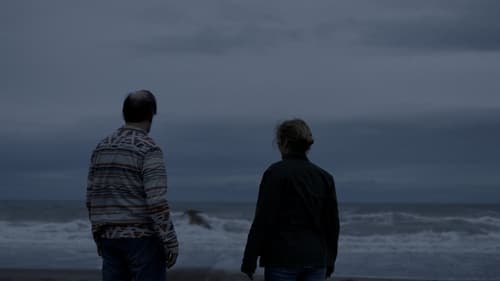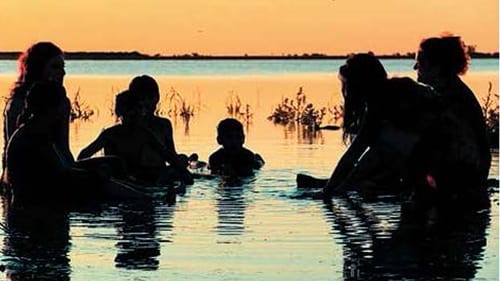
Editor
Dismantling the home of some who is no longer here is an act of love, of memory, of mourning. July passed away recently; the camera moves around her apartment and is placed on a series of objects that act as keys to open the door to her intimacy. The voices of those who have loved her guide us while they try to prolong the farewell. In the memories they evoke, to some people July is still Julio, and those names and pronouns that blend reveal the difficulties of embracing one’s identity as a trans woman. During the journey, July’s figure is slowly brought to life, as in an invocation, called on through words, but mainly through her spaces, her things, her photographs, her wigs, her clothes, her favorite music. And a biography is weaved together, one which, like that mirror that still hangs on her wall, reflects the history of an entire community.

Editor
Greta and Bruno, her husband, struggle with grief after the disappearance of their son. Their friend Sina travels to the coast to help them sell their summer house.

Editor
High school students find their way in life at Las Delicias agrotechnical boarding school in the Argentine countryside. This striking coming-of-age film takes place against an inviting backdrop of fields of crops, greenhouses full of tomato plants, and the somewhat dilapidated school buildings, where dogs and chickens roam.

Producer
High school students find their way in life at Las Delicias agrotechnical boarding school in the Argentine countryside. This striking coming-of-age film takes place against an inviting backdrop of fields of crops, greenhouses full of tomato plants, and the somewhat dilapidated school buildings, where dogs and chickens roam.

Editor
The journey back home has been a recurring narrative ever since humans started to tell stories. Because going back to one’s origins is always related to identity, a dilemma that never ceases to hit close to home

Editor
Agatha and Leonidas have a somewhat absorbing mother-child relationship: Agatha never fell in love again, and Leonidas doesn't know what love is. From one day to the next, Agatha wakes up in the body of a seven-year-old girl.

Editor
Cecilia is too afraid one night to let her housekeeper’s son into the house. The next day his dead body is found.

Editor
Rodrigo and his mother travel to the town where his older brother just died. In this calm place they will go through the first stages of their mourning. Rodrigo will start to peer on grown-ups grief and, imperceptibly, will begin to leave childhood behind. His mother will try to uncover the mysteries surrounding that death. A story suspended in time, floating between the countryside lost places.

Editor
A feature film that focuses on the particular relationship that a group of women entertain with cats that live in an abandoned vacant lot in the Colegiales neighborhood. An intrusive camera, almost imperceptible to the neighbors and to the cats, immerses us in the day-to-day life of the animals and the women who are dedicated to feeding and caring for them.

Editor
In shades of gray, the calm, static shots show young female visitors to a public hospital in Argentina. This is the place where teenage girls have to make a decision about the new life growing inside them. A few of them have, at a very young age indeed, already had children. For others, the idea of a future as a mother is new and terrifying. In many cases, though, having an abortion isn’t a decision to be taken for granted. Some of the girls have learned from childhood that getting pregnant is your own fault, and you have to accept the consequences. What they know about abortion comes from horror stories of clandestine practices in backstreet clinics. The hospital gynecologists and other staff, who can be heard but not seen, ask the girls about their well-being, their relationship, their family ties, and how they see the future—with or without a child. In these intimate and non-judgmental conversations, the girls respond with powerful candor in their most vulnerable moments.

Editor
Tania learns that her grandmother spent the last years of her life in the loving company of an alien. Together with two friends, the Trans woman travels through rural Argentina to bring the creature back to its place of origin.

Editor

Editor
Leon, Flavia’s partner for eight years, has died. As Flavia mourns her loss, she is also confused, overwhelmed by daily tasks and situations which make her feel fragile and incomplete. Her very life is an unknown. Lucia, Leon’s daughter by his former wife, barges into Flavia’s life in search of the father gure who is no longer around. Her encounters with the child confront her with her own doubts and desire of being a mother. Flavia will have to resign herself to the fact that a life project has ended, and learn to find a new one.

Editorial Consultant
A sixteen year old with Asperger's creates telenovelas at home with his 97-year old grandmother.

Editor
After the death of his father, Eduardo Crespo embarks on a journey to film a movie as they would have done together. A film about Crespo, the town where they come from, poultry farming, and the relationship the father and son used to have. Now that the main character is no longer there, the film travels around the same places. Trying to put together, through the town collective memories and a personal memory, in order to reconstruct from all these details, the figure of that father who is not there anymore.

Director

Editor
La Paz is the story of Liso, a young man who emerges from a psychiatric institution and tries to re-adapt to daily life in the universe of his middle class family and neighborhood. Though everything seems difficult, under the surface and very subtly things start to change for him.

Editor
Three women travel to a distant place to do welfare work. They assist, listen, stay with the unprotected. An old hospital in ruins accommodates them. The imposed group life gets more complex as they start to know each other. The relationship with the others, the community, is also difficult. But, as days go by, they will start to melt into that human landscape surrounding them. To be part of the mystery of otherness.

Editor
"I was not afraid today" are two films at the same time. The first one portrays two sisters in their daily lives and the second one gets rid of the linear narration in search of a free manipulation of the visual and sound texture.

Editor
Follows a group of friends adrift in a swampy after-hour: at dawn after a party, where the body struggles between arousal and extenuation.

Editor
Ceci, a seven year old girl, has to keep a huge secret, but she doesn't completely understand what is the secret about. The life of her family depends on her silence. But what exactly must she keep silent about? Ceci and her mom live hidden from military repression in Argentina. Ceci asks herself: what must she say? What should she really believe and do in order to deserve the love of her mother and others?

Editor
Ruth has been with Nora for fourteen years. Everybody knows about their relationship except for her mother Estela, who has never suspected it. Ruth, who is almost forty, feels the need to confess her homosexuality to her mother, who at first is shocked and collapses on the floor. She then feels the desire to understand her daughter, who has hidden an important part of her life from her for many years. So elderly Estela begins to discover the L-World: she reads books and magazines, she tries to meet her daughter's ex girlfriends and she goes to lesbian nightclubs and meeting-places, creating misunderstandings and comic situations. What does Ruth think about this? At first, she is annoyed by her mother's intrusion into her life, but she will soon understand Estela's reasons and she will rely on her to get over her crisis with Nora. This sharp, amusing comedy deals with the difficult parent-child relationship, which is portrayed through irony and without hypocrisy.

Editor
Lucio is 10 years old and lives in the country with his parents. Play solitaire in the bush and record the sounds of nature with an old radio recorder. He dreams of going to town when he grows up and working on television. In fact, this is the only means that connects you to that other part of the world that you are eager to discover. One day two subjects who come from the city come to his house by accident, one of them is called Carlos, he is 30 years old and works on television. This will be a very important day for Lucio.

Editor
A documentary about Néstor Perlongher. His life, his poems, and his activism in Argentina's Frente de Liberación Homosexual (homosexual liberation front).




















